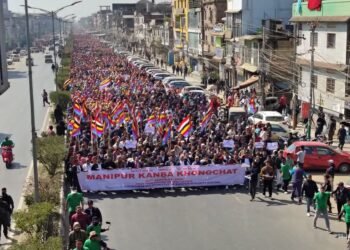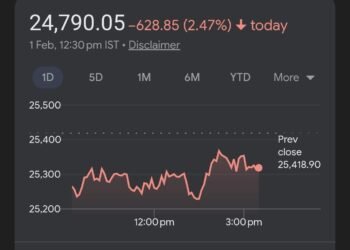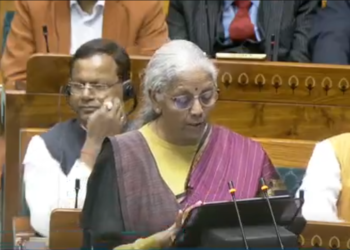As Naga leaders push for a renewed commitment to peace talks, the Global naga Forum has accused the Indian government of betraying the Naga people’s trust, citing a history of broken agreements and political double-dealing.
BY PC bureau
The Naga community is growing restless as the long-stalled peace negotiations with the Government of India continue to drag on. Various Naga leaders, especially from the National Socialist Council of Nagaland (NSCN), have raised their voices in recent months, urging the Indian government to resume the peace process. Their appeals come after a series of setbacks and broken promises by the Centre that have left the Naga people frustrated and increasingly disillusioned.
The Global Naga Forum (GNF), which represents various Naga civil society groups, has voiced strong criticism of the Indian government’s stance on the negotiations. In a release, the forum stated that the government’s failure to honor past agreements has resulted in a “repetitive history of bad faith dealings” with the Naga people. Echoing the concerns of the NSCN (IM), the forum warned that further delays in implementing the Framework Agreement would only deepen the frustration among the Naga people and prolong the uncertainty that has marked their struggle for self-determination.
ALSO READ: Myanmar, Thailand, and China Join Forces to End International Cyber Crime Epidemic
The GNF also applauded the 21 MPs who recently signed a memorandum seeking the resumption of Naga peace talks, calling it a crucial step in drawing national attention to the plight of the Naga people. Their support for the Framework Agreement, the GNF noted, underscores the growing recognition of the Naga people’s aspirations and the urgent need for a political solution that can bring lasting peace and justice.
The GNF also demanded a transparent and internationally monitored peace process. “The patience of the Naga people has been tested beyond reason—seventy-seven years and running, since India’s independence in 1947,” the statement noted. It questioned whether India would act “in good faith as a mature, responsible democracy” or continue “its legacy of broken promises.”
ALSO READ: Christians Protest Arunachal’s Freedom of Religion Act
In the end, GNF said that, “History will remember where India and every stakeholder stood on the democratic and human rights question of Naga self-determination.”
Memorandum by 21 MPs:
Recently, a group of 21 members of parliament submitted a memorandum to Union Home Minister Amit Shah, urging the Government of India to expedite the peace talks that have been stalled for years. According to the NSCN (IM), this memorandum was a “wake up” call for the Centre and its “persistent apathy” toward the Naga people’s aspirations.
The memorandum, viewed as a critical move to reawaken the stalled peace talks, urges the Indian government to take immediate action and honor its previous commitments, particularly the Framework Agreement (FA) signed in 2015. This agreement was initially hailed by Prime Minister Narendra Modi as a breakthrough, but the process has since stagnated. NSCN (IM) and other Naga groups have accused the Indian government of backtracking on its promises by later signing a separate agreement, the Agreed Position (AP), with another Naga faction in 2017—a move that the NSCN (IM) and others perceive as undermining the original Framework Agreement.
The memorandum further called for the elevation of the Naga peace talks interlocutor to a Union Ministerial level, a move originally proposed in 2024 by the Nagaland Government and supported by various civil society organizations. This proposal, the NSCN (IM) argues, would signify the Indian government’s serious commitment to resolving the Naga issue once and for all.
In response to the government’s continuing failure to engage meaningfully in the peace process, the NSCN (IM) recently issued a scathing criticism of the central government, accusing it of “wilful neglect” and “double dealings” throughout the negotiations. The NSCN (IM) decried the government’s inconsistent approach over the decades, pointing to the long history of broken promises—from the Nine-Point Agreement of 1947 to the Framework Agreement of 2015. NSCN (IM) leaders have argued that the Indian government has repeatedly failed to meet its political and moral responsibilities in resolving the Naga issue and has instead attempted to shift the blame onto the Naga side for the lack of progress.
The NSCN (IM) has been particularly vocal in denouncing the Indian government’s treatment of the Naga people’s aspirations for self-determination. The outfit asserted that the Naga people have always maintained their right to self-govern in their homeland without external interference, and that the Indian state’s actions have continually undermined this right. As the NSCN (IM) puts it, “Nagas don’t need other people’s permission to live and govern ourselves in our homeland.” Despite their commitment to peaceful negotiations, the Naga people are now demanding a meaningful resolution to a conflict that has persisted for over seven decades.
As the Naga leaders continue to call for the resumption of peace talks, they are also demanding transparency in the process, with calls for an internationally monitored peace process to ensure fairness and accountability. The NSCN (IM) has warned that unless the Indian government acts with sincerity and urgency, the situation will continue to deteriorate.
Key Statements on Naga Peace Talks
NSCN (IM): “The Indian government’s backtracking on the Framework Agreement is a breach of trust, and its failure to engage sincerely in the peace process is a betrayal of the Naga people.”
- Global Naga Forum (GNF): “The Government of India has neglected its duty to resolve the Naga issue, and its actions reflect a pattern of broken promises over the past 77 years.”
- 21 MPs Memorandum: “We urge the Government of India to resume peace talks and ensure that the interlocutor’s status is elevated to a Union Ministerial level to give these talks the seriousness they deserve.”
The situation remains precarious, and the growing frustration among Naga leaders and the people themselves highlights the urgency of the matter. The Naga people have waited for decades for a resolution to their conflict, but time is running out, and their patience is waning. The Government of India now faces a critical decision—whether to honor its commitments and take meaningful steps toward peace, or continue its legacy of inaction and broken promises. As this conflict continues to unfold, the Naga people are watching closely, hoping for a just and lasting resolution to their struggle for self-determination.













